Your Most effective method of curing a concrete slab images are ready in this website. Most effective method of curing a concrete slab are a topic that is being searched for and liked by netizens today. You can Find and Download the Most effective method of curing a concrete slab files here. Get all free photos and vectors.
If you’re looking for most effective method of curing a concrete slab pictures information related to the most effective method of curing a concrete slab interest, you have visit the right blog. Our site always gives you hints for downloading the maximum quality video and picture content, please kindly surf and locate more enlightening video articles and images that fit your interests.
Most Effective Method Of Curing A Concrete Slab. For moisture loss from the concrete surface by wrapping it with an impermeable membrane the membrane curing method is applied or adopted and the curing compounds are wax and water-based liquid and to create an impermeable membrane these are sprayed over fresh concrete. Curing by spraying of water is one of the conventional methods of curing concrete in the construction industry. In the time between concrete placement and finishing water can begin to bleed and evaporate from the surface. Plastic is usually placed on top of the burlap to keep the moisture in as much as possible.
 What Should Be The Minimum Curing Period Of Concrete From gharpedia.com
What Should Be The Minimum Curing Period Of Concrete From gharpedia.com
Initial and final curing. 28 days water curing increases it to 95. In the time between concrete placement and finishing water can begin to bleed and evaporate from the surface. The timing of application is critical. One of the most common methods for curing concrete is to hose it down frequently with waterfive to 10 times per day or as often as you canfor the first seven days. In some cases wet coverings such as wet gunny bags jute matting and straw are wrapped to the vertical surface for keeping the concrete wet.
Membrane Curing of Concrete Another method of.
This method is adopted in cold climatic regions. For horizontal surfaces sawdust earth or sand are used as wet coverings to keep the concrete in. This will reduce the loss of wetness from concrete. Where the hydration temperature is high especially in thick concretes the formwork curing method is used. One of the most common methods for curing concrete is to hose it down frequently with waterfive to 10 times per day or as often as you canfor the first seven days. It can be an efficient method for curing by supplying additional moisture during hot weather.
 Source: happho.com
Source: happho.com
These conventional methods for curing concrete successfully fall into two stages. It can be an efficient method for curing by supplying additional moisture during hot weather. Spraying and fogging. Spraying and fogging are used when the ambient temperatures are well above freezing and the humidity is low. Polyethylene film is an effective moisture barrier for curing concrete and easily applied to complex as well as simple.
 Source: theconstructor.org
Source: theconstructor.org
Just make sure you use a cure and seal material that complies with the requirements of ASTM C1315 Type 1 Class A. The waxy substance helps hold the moisture in the concrete for optimal hydration. Initial and final curing. If sprinkling is done at intervals care must be take to prevent the concrete from drying between applications of water. In some cases wet coverings such as wet gunny bags jute matting and straw are wrapped to the vertical surface for keeping the concrete wet.
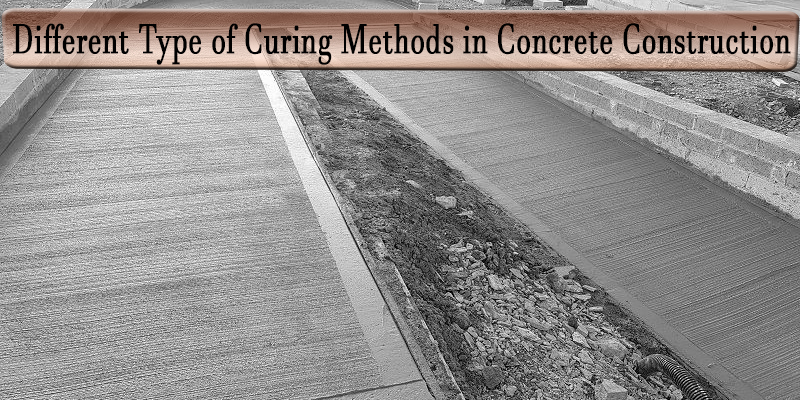 Source: shyamsteel.com
Source: shyamsteel.com
If feasible water curing remains the best method and for colored concrete a cure and seal is often your best bet. These conventional methods for curing concrete successfully fall into two stages. It must be applied as soon as the concrete has lost its surface sheen. Inadequate or insufficient curing is one of main factors contributing to weak powdery surfaces with. CURING METHODS AND MATERIALS Concrete can be kept moist and in some cases at a favor-able temperature by three curing methods.
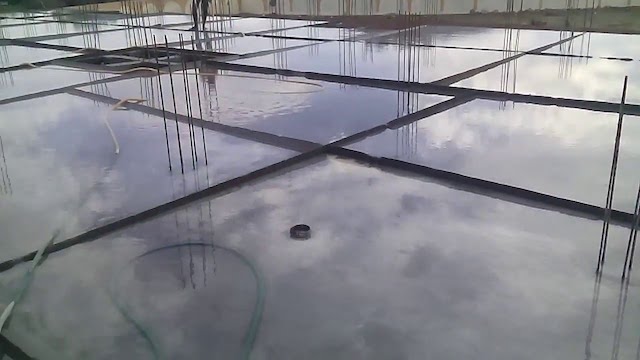 Source: aboutcivil.org
Source: aboutcivil.org
Curing by spraying of water is one of the conventional methods of curing concrete in the construction industry. Inadequate or insufficient curing is one of main factors contributing to weak powdery surfaces with. Applying membrane-forming curing compounds. Polyethylene film is an effective moisture barrier for curing concrete and easily applied to complex as well as simple. This method is adopted in cold climatic regions.

Curing of Concrete by infrared radiation. Initial and final curing. Concrete that is allowed to dry out quickly also undergoes considerable early age drying shrinkage. The timing of application is critical. Just make sure you use a cure and seal material that complies with the requirements of ASTM C1315 Type 1 Class A.
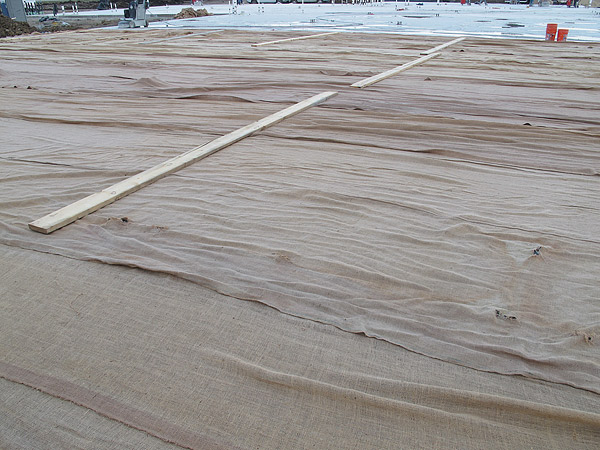 Source: concretedecor.net
Source: concretedecor.net
Fog mist is applied through nozzles or sprayers to raise the relative humidity of the air. For horizontal surfaces sawdust earth or sand are used as wet coverings to keep the concrete in. Spraying and fogging. Spraying and fogging are used when the ambient temperatures are well above freezing and the humidity is low. Keeping concrete moist is therefore a most effective way of increasing its ultimate strength.
 Source: canzac.com
Source: canzac.com
Fogging or fog spraying is effective in reducing the chances of plastic shrinkage cracking in mixes with low rates of bleeding. CURING METHODS AND MATERIALS Concrete can be kept moist and in some cases at a favor-able temperature by three curing methods. The materials commonly used for curing horizontal surfaces such as roads pavements domestic and industrial floor slabs include. Covering Concrete Surfaces With Hessian or Gunny Bags. Spraying and fogging.
 Source: civildigital.com
Source: civildigital.com
One of the most common methods for curing concrete is to hose it down frequently with waterfive to 10 times per day or as often as you canfor the first seven days. If feasible water curing remains the best method and for colored concrete a cure and seal is often your best bet. It can be an efficient method for curing by supplying additional moisture during hot weather. Initial and final curing. Concrete that is allowed to dry out quickly also undergoes considerable early age drying shrinkage.
 Source: youtube.com
Source: youtube.com
Shading Of Concrete Work. If sprinkling is done at intervals care must be take to prevent the concrete from drying between applications of water. The timing of application is critical. This will reduce the loss of wetness from concrete. The object of shading concrete work is to prevent the evaporation of water from the surface.
 Source: gharpedia.com
Source: gharpedia.com
A wet cure is often applied by wetting burlap and laying it across the concrete. This can be done by. Spraying and fogging. One method to help cure new concrete pavement is the wet burlap fabric method. 28 days water curing increases it to 95.
 Source: concretedecor.net
Source: concretedecor.net
Steam has heat moisture in it and it is sprayed on the concrete surface to keep concrete moisture and also increases the concrete temperature which eventually quickens the pace of hardening concrete. For horizontal surfaces sawdust earth or sand are used as wet coverings to keep the concrete in. A wet cure is often applied by wetting burlap and laying it across the concrete. The formwork curing provides more safety due to the variations in the surface of the concrete when the cracking risk becomes an issue in large concrete. Fogging or fog spraying is effective in reducing the chances of plastic shrinkage cracking in mixes with low rates of bleeding.
 Source: giatecscientific.com
Source: giatecscientific.com
If sprinkling is done at intervals care must be take to prevent the concrete from drying between applications of water. The formwork curing provides more safety due to the variations in the surface of the concrete when the cracking risk becomes an issue in large concrete. To fully appreciate what a powerful technique fogging is and how important it can be we have to understand three. It can also make the difference between success and failure in controlling evaporation between placing and curing the concrete. These conventional methods for curing concrete successfully fall into two stages.
![]() Source: civiconcepts.com
Source: civiconcepts.com
Initial and final curing. CURING METHODS AND MATERIALS Concrete can be kept moist and in some cases at a favor-able temperature by three curing methods. Curing by spraying of water is one of the conventional methods of curing concrete in the construction industry. Continuous sprinkling with water is also an excellent method of curing. These conventional methods for curing concrete successfully fall into two stages.
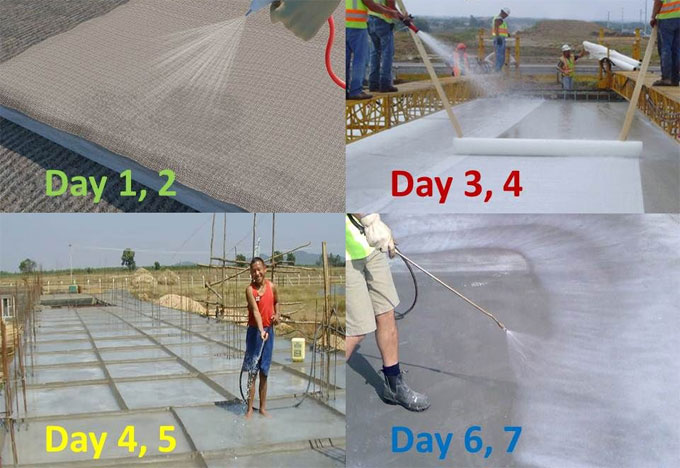 Source: constructioncost.co
Source: constructioncost.co
By using nozzles or sprayers water is sprayed on the concrete members which are to be cured. The materials commonly used for curing horizontal surfaces such as roads pavements domestic and industrial floor slabs include. Where the hydration temperature is high especially in thick concretes the formwork curing method is used. Penetrating sealers help protect reinforcing steel. If feasible water curing remains the best method and for colored concrete a cure and seal is often your best bet.
 Source: sephakucement.co.za
Source: sephakucement.co.za
Fog mist is applied through nozzles or sprayers to raise the relative humidity of the air. One method to help cure new concrete pavement is the wet burlap fabric method. Keeping concrete moist is therefore a most effective way of increasing its ultimate strength. The waxy substance helps hold the moisture in the concrete for optimal hydration. These include ponding or immersion spraying or fogging and saturated wet coverings.
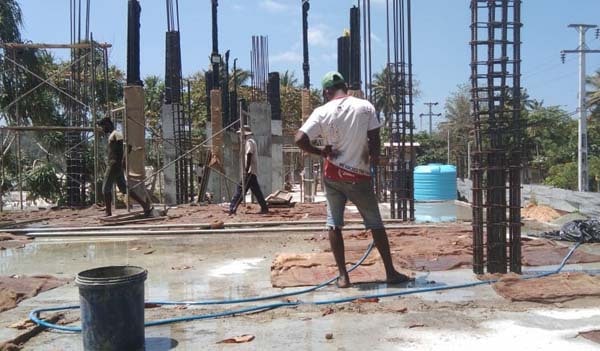 Source: structuralguide.com
Source: structuralguide.com
Inadequate or insufficient curing is one of main factors contributing to weak powdery surfaces with. The formwork curing provides more safety due to the variations in the surface of the concrete when the cracking risk becomes an issue in large concrete. Applying membrane-forming curing compounds. Just make sure you use a cure and seal material that complies with the requirements of ASTM C1315 Type 1 Class A. This can be done by.
 Source: quora.com
Source: quora.com
This method is adopted in cold climatic regions. Steam has heat moisture in it and it is sprayed on the concrete surface to keep concrete moisture and also increases the concrete temperature which eventually quickens the pace of hardening concrete. The formwork curing provides more safety due to the variations in the surface of the concrete when the cracking risk becomes an issue in large concrete. It must be applied as soon as the concrete has lost its surface sheen. Proprietary spray-applied membrane at least 90 efficiency recommended.
 Source: gharpedia.com
Source: gharpedia.com
Initial and final curing. Ad Concrete Curing Compounds. Proprietary spray-applied membrane at least 90 efficiency recommended. In construction the formwork is the most effective curing. For moisture loss from the concrete surface by wrapping it with an impermeable membrane the membrane curing method is applied or adopted and the curing compounds are wax and water-based liquid and to create an impermeable membrane these are sprayed over fresh concrete.
This site is an open community for users to do submittion their favorite wallpapers on the internet, all images or pictures in this website are for personal wallpaper use only, it is stricly prohibited to use this wallpaper for commercial purposes, if you are the author and find this image is shared without your permission, please kindly raise a DMCA report to Us.
If you find this site helpful, please support us by sharing this posts to your favorite social media accounts like Facebook, Instagram and so on or you can also bookmark this blog page with the title most effective method of curing a concrete slab by using Ctrl + D for devices a laptop with a Windows operating system or Command + D for laptops with an Apple operating system. If you use a smartphone, you can also use the drawer menu of the browser you are using. Whether it’s a Windows, Mac, iOS or Android operating system, you will still be able to bookmark this website.






